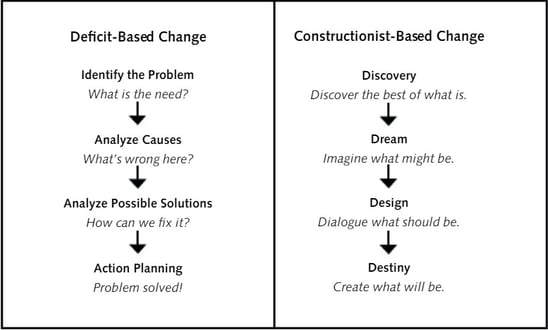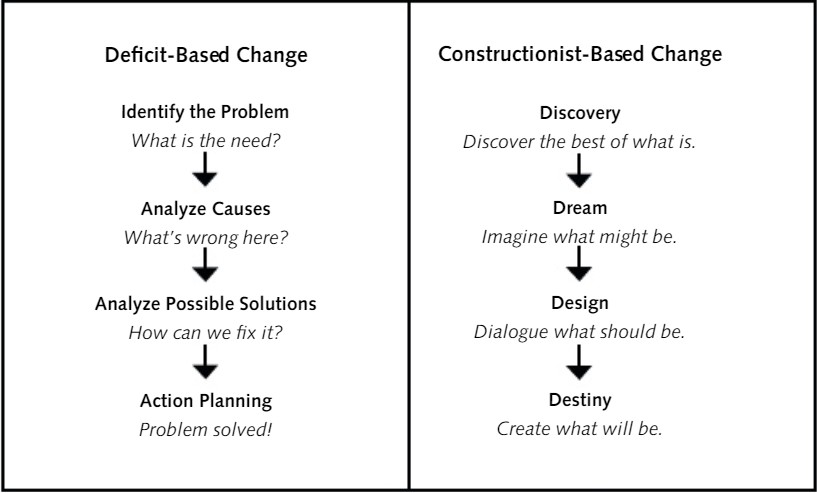Appreciative Inquiry
The climate change alarm has reached a screeching level in the past couple of weeks. As pundits, activists, deniers, and those willfully oblivious look for the data, evidence, and storyline that supports their climate view, far too much time is spent spinning in place with little meaningful action taken. So much time and attention is spent on identifying, or denying, a problem. I wonder what might happen if we took a different approach?
“Appreciative Inquiry (AI) … focuses on what’s working well, analyzing why it is working well, and how to do more of it.”[1] Rather than focusing on the problem, or deficit, we imagine where we want to be and move in that direction. The figure[2] below presents these contrasting models for change.

Following the constructionist-based change approach, in the Discovery phase we seek to understand the ‘best of what is now’ and ‘what was before’. The Dream phase is an imaging of ‘what might be’, of thinking large outside the boundaries of the past, of realizing a greater potential. In the Design phase, we get to make choices about ‘what should be’, while the Destiny phase is the beginning of our “inspired actions” to create ‘what will be’.[3]
Our fixation on the ‘problem of climate change’ has us frozen in place, unable to gain agreement on a problem, or cause, let alone a solution. What if, instead, we shifted our focus to imagining what might be the future earth we would all like to inhabit, and identifying what we can each do to create that future earth? Is it possible that together, united for positive change, we can overcome the quicksand of inaction?
In the Next Issue
In the next few posts, let’s explore how appreciative inquiry can be a vital component for shifting how, when, why, and where energy is used by diving more deeply into the discovery, dream, design, and destiny phases of appreciative inquiry.
[1] Appreciative inquiry was developed in the 1980s by Dr. David Cooperrider and Dr. Ron Fry of Case Western Reserve University. See https://weatherhead.case.edu/centers/fowler/business/appreciative-inquiry for more info.
[2] Bernard J. Mohr, Watkins, J. M., The Essentials of Appreciative Inquiry: A Roadmap for Creating Positive Futures, https://www.academia.edu/3369203/The_essentials_of_appreciative_inquiry_A_roadmap_for_creating_positive_futures
[3] These four phases are beautifully described here, How to co-create an innovative culture with appreciative inquiry?, https://www.podravka.com/company/knowledge-in-focus-2016/blog-speakers-at-knowledge-in-focus-2016/how-to-co-create-an-innovative-culture-with-appreciative-inquiry/
About This Blog
We are on the brink of an evaluation renaissance. Smart grids, smart meters, smart buildings, and smart data are prominent themes in the industry lexicon. Smarter evaluation and research must follow. To explore this evaluation renaissance, I am looking both inside and outside the evaluation community in a search for fresh ideas, new methods, and novel twists on old methods. I am looking to others for their thoughts and experiences for advancing the evaluation and research practice.
So, please…stay tuned, engage, and always, always question. Let’s get smarter together.

